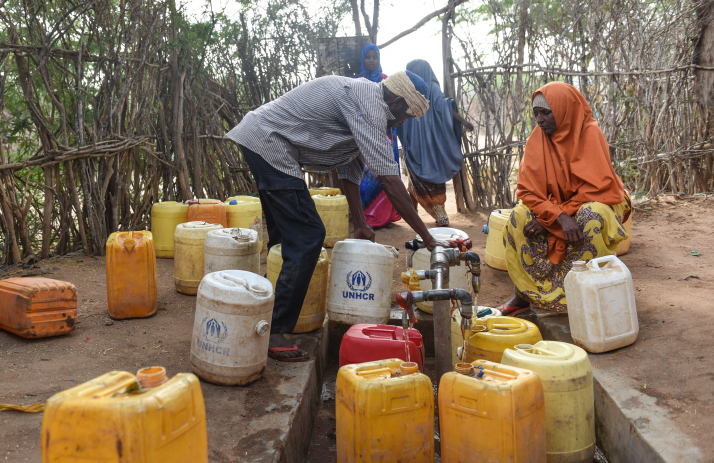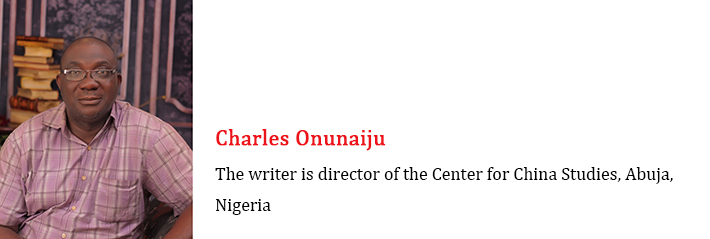|
||||||||||
| Home Nation World Business Opinion Lifestyle ChinAfrica Multimedia Columnists Documents Special Reports |
|
||||||||||
| Home Nation World Business Opinion Lifestyle ChinAfrica Multimedia Columnists Documents Special Reports |
| ChinAfrica |
| Into the Fold |
| Refugees, internally displaced persons, returnees and the challenge of integration in Africa |
| By Charles Onunaiju | VOL.11 March ·2019-03-04 |

The 32nd Ordinary Summit of the African Union (AU), held in Addis Ababa, capital of Ethiopia on February 10-11, set "Refugees, Returnees and Internally Displaced Persons: Toward Durable Solutions to Forced Displacement in Africa" as its theme, under which African leaders discussed solutions to the long-lasting problem affecting the continent.
In addition, October this year also marks the 10th year after the heads of state and government of the AU member states adopted and signed the Kampala Declaration on Refugees, Returnees and Internally Displaced Persons in Africa in October 2009.
Despite this declaration, in which leaders undertook "to examine further all the factors that cause or contribute to forced displacement of people in Africa, with a view to taking measures that will prevent and finally eliminate from our continent the occurrence of forced displacement of people arising from conflict and natural disasters," the AU estimates that there are now at least 6 million internally displaced persons in Africa and the figure keeps rising because of ongoing conflicts on the continent.
The United Nations High Commission for Refugees (UNHCR) estimates that there are currently 1.2 million people in Africa who are vulnerable and desperately in need of settlement and the number of places offered each year for resettlement is only for about 100,000 people.
It is therefore of utmost concern that at the 10th anniversary of the declaration adopted in 2009 to provide legal protection and assistance to millions of internally displaced persons, the problem remains largely unresolved. Continually, people are forced to leave their homes, often brutally, to escape conflicts, effects of climate change such as declining agricultural production, water scarcity, and rising sea levels, or just to migrate elsewhere, with the hope of finding a better life.
Root causes
Africa's biggest economy and its most populated nation Nigeria has been in the throes of the crises of refugees and internally displaced persons for all the reasons mentioned above. In its northeastern region, the epicenter of the deadly insurgency orchestrated by the extremist religious terror group Boko Haram, the number of internally displaced persons reached epic proportions in the period before 2015 and since then, considerable efforts have been made to help returnees settle down. However ongoing attacks by the Boko Haram, especially those focused on soft targets such as returnee villages, local markets, and places of worship, have hindered other internally displaced persons in camps from returning.
Since there is no obvious face of the terror group and even clear cut demands on which the government can reach a negotiated settlement with the extremist insurgents, the government relies extensively on total military defeat to rout Boko Haram. And while considerable military advances have been made in curtailing the atrocities of the insurgents, convincing the internally displaced persons to return to their homes has been an uphill task, especially given the miserable fate of those who have returned.
In addition to Boko Haram induced conflicts in the region, the drying up of Lake Chad has had a heavy impact on the social fabric. The Lake Chad basin cuts across five countries: Nigeria, Niger, Chad, Cameroon and the Central African Republic, meaning millions of people depend on the waters for fishing, farming, and subsistence economic activities. The drying up of water in the lake has forced people to look elsewhere for their livelihood.
The movement of herders southward in search of grazing pastures on account of the drying Lake Chad brings them into headlong conflicts with farmers, triggering one of the intense conflicts in the Middle Belt Region of Nigeria, which has produced hundreds of internally displaced persons.
Outside Nigeria, the crises in the Great Lakes Region remains tense, despite a peaceful transition of power in the Democratic Republic of the Congo recently, where an opposition was elected to office, the first time in the country's 50 plus years of difficult history.
The lingering conflict in South Sudan, Africa's newest state, has created a huge swathe of internally displaced persons, even larger than the period before South Sudan became a sovereign state.
Much work ahead
Looking back at the 10 years since the Kampala Declaration on Refugees, Returnees and Internally Displaced Persons in Africa was ratified, the challenge defined and pledges made to resolve the issues remain largely unfulfilled.
One of the chronic issues identified in the cause of conflicts is the lack of institutional frameworks to cater for the growing number of people who wish to take part in the routine general elections.
Institutional reforms remain critical because existing institutions do not accommodate, let alone respond adequately to, diverse and complex demands made on them. The reforms of state institutions that mirror known indigenous variables of participation and inclusion will play important and pivotal roles in stemming the conflicts and its consequence of forced migrations.
Despite the important steps to address economic and social issues in Africa, a huge gap still remains in fostering sustainable and inclusive economic development. Most of the key infrastructures that would trigger inclusive economic growth are in their infancy and therefore their full effects would only come in the future.
Declarations of good intentions at continental levels are hallmarks of Pan-African endeavor, but actionable policies remain the prerogatives of sovereign nation-states on the continent. Until they take seriously their responsibilities to protect their respective people and build critical capacities and mechanisms to discharge their duties, the lingering crises of internally displaced persons, refugees and returnees would be a sore point in the contemporary narratives of Africa's renaissance.
Just as it did 10 years ago, the 32nd AU Ordinary Summit again focused on the solutions to refugees, returnees and internally displaced persons, which indicated that the problems within Africa should be solved by Africa itself, without external interventions.

| About Us | Contact Us | Advertise with Us | Subscribe |
| Copyright Beijing Review All rights reserved 京ICP备08005356号-5 京公网安备110102005860号 |